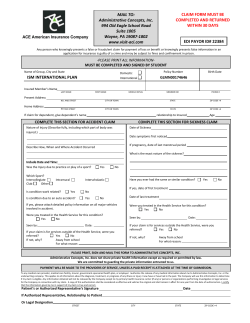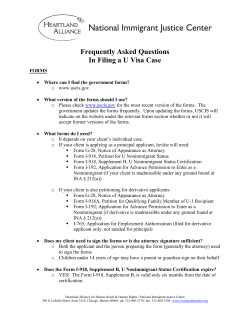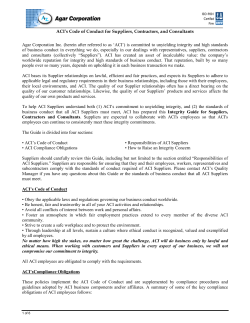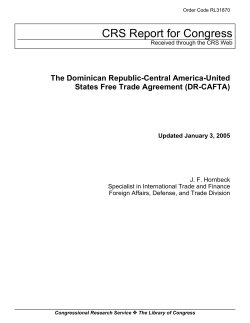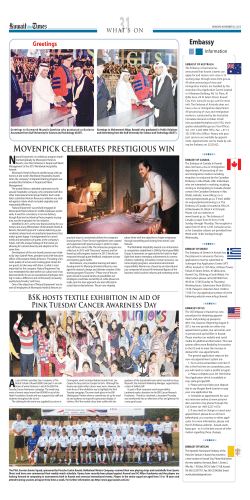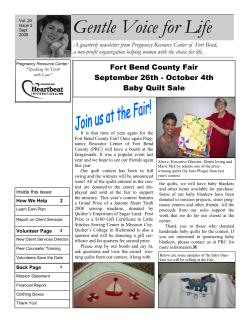
Costa Rica ¡Bienvenidos a nuestro país! 1
Costa Rica ¡Bienvenidos a nuestro país! 1 Contents page 1. Hola y Bienvenido .............................................................................................. 4 1.1 1.2 1.3 1.4 1.5 1.6 1.7 1.8 1.9 1.10 1.11 1.12 1.13 1.14 1.15 1.16 2. ACI-Costa Rica (ACI-CR)..................................................................................... 21 2.1 2.2 2.3 2.4 3. Principles ......................................................................................................... 21 Objectives ........................................................................................................ 21 Goals ................................................................................................................ 22 ACI-CR’s Staff ................................................................................................... 22 Volunteering with ACI-CR ................................................................................. 23 3.1 3.2 3.3 3.4 3.5 3.6 3.7 3.8 3.9 4.0 4.1 2 Facts at a glance ................................................................................................ 5 Geography ......................................................................................................... 6 Climate .............................................................................................................. 7 Environment ...................................................................................................... 8 Landscapes ........................................................................................................ 9 History ............................................................................................................. 10 Government & Economy ................................................................................. 11 Values and Attitudes ....................................................................................... 12 Religion ............................................................................................................ 13 Holidays ........................................................................................................... 13 Costa Rican Life ............................................................................................... 14 Making Friends ................................................................................................ 15 Travelling in Costa Rica.................................................................................... 15 Safety and Health ............................................................................................ 16 A Volunteer’s Experience ................................................................................ 17 Languages ........................................................................................................ 20 What do we expect from you? ........................................................................ 23 What can you expect from ACI-CR? ................................................................ 23 What do we not offer? .................................................................................... 24 What do you have to do before coming to Costa Rica? ................................. 24 What to pack? ................................................................................................. 24 Visa Process in Costa Rica ............................................................................... 25 General Observations ..................................................................................... 27 Important Information .................................................................................... 27 WORK PROFILE – Volunteer Placements in Costa Rica ................................... 28 Rules & Regulations......................................................................................... 30 Links ................................................................................................................. 32 ¡IMPORTANTE! Este 'National Profile' contiene información muy importante sobre el programa de ICYE en Costa Rica. Por favor, si hay algo que no entiendas, pide que alguien te lo traduzca. IMPORTANT! This ´National Profile´ Contains very important information about the ICYE programme in Costa Rica. Please, if there is something that you do not understand, use a translator or ask someone to translate it. IMPORTANT! Ce Profil National contient des informations très importantes sur le programme ICYE Costa Rica. S'il te plaît, s'il y a quelque chose que tu ne comprends pas, demande à quelqu'un de te le traduire. WICHTIG! Dieses "National Profile" enthält wichtige Informationen über das ICYE-Programm in Costa Rica. Wenn du etwas nicht verstehst, dann lass es dir bitte von jemandem übersetzen. VIGTIGT! Denne nationale profil indeholder meget vigtig information om det costarikanske ICYE program. Hvis der er noget du ikke forstaar, saa spoerg endelig nogen til at oversaette for dig. OBS!! Denna broshyr 'National Profile' innehåller mycket viktig information om ICYE:s program i Costa Rica. Om där är något du inte förstår fråga någon för hjälp att översätta. Mikilvægt! Þessi "Nacional Profile" inniheldur mjög mikilvægar upplýsingar um ICYE í Kosta Ríka. Ef það er eitthvað sem þú skilur ekki vinsamlegast biddu einhvern um að þýða það fyrir þig. Tarkeaa! Tama kansallis profiili sisaltaa tarkeaa tietoa ICYE ohjelmasta Costa Ricassa. Jos et ymmarra jotain, ole ystavallinen ja pyyda jotakuta kaantamaan teksti. 3 1. ¡Hola y Bienvenido! Hello and welcome to ACI Costa Rica’s National Profile. By now you have already decided on Costa Rica as your destination of choice, or are in the process of making your decision. In Whichever the case may be, this profile will provide you with important information before your arrival in Costa Rica, or help give you an idea of our country and the programmes we offer, in order to make the choice easier for you. You are about to embark on an adventure which is filled with exciting, challenging and engaging experiences! There are lots of things, which you would like to know and others you really need to know about Costa Rica, before arriving. Take some time to read through this profile, so that you can get an impression of Costa Rica, which is a highly diverse country in Central America, with copious biodiversity, beaches, volcanoes and tropical jungles. It is also one of the most economically stable countries in Latin America, with an economy focused on exports, ranging from traditional crops like coffee or pineapple to rocket engine parts and computer chips. We want to leave you with an idea of our beautifully diverse land by giving general information about day-to-day living and country facts—to cultural information and recommendations about the programmes that we offer. We aim to give you an honest description of our country, our organisation and the projects which are open to you. If you have any questions or would like more information on a particular area, please do not hesitate to send us an email. Thank you—The ACI Incoming Team 4 1.1 Facts at a glance The official language is Spanish—on the Caribbean coast a Creole dialect is also spoken. There is also a small indigenous population who have their own language. English is spoken by many in the larger cities. ● Currency Colones 1 (EUR) Euro = 673 1 (USA) Dollar = 510 1 (GBP) Pound = 788 (October 2011) The capital city is San José, which is located in the Central Valley, at 1150 m. above sea level and with a population of 1.5 million Time Zone: GMT 6 7 hours behind Europe in the Winter and 8 hours behind the Fruit vendors on the busy streets of SaninJosé summer Telephone code: Total population 4,576,562 (July 2011) Area 51.000km² +506 Emergencies: 911 Catholicism is the main religion in the country, most of the national holidays and customs have catholic origins The President is Laura Chinchilla (2010—2014) - First female elected as president in this country. Electricity 110 V Which means you will need to bring along some adaptors; for your mobile, laptop.. Or any other electronic device. 5 1.2 Costa Rica´s Location Co-ordinates 10 00 N 84 00 W One of the 7 countries of Central America, Costa Rica is located on the Pacific ―ring of fire‖, earthquakes and minor tremors can occur, and there are in total 7 active volcanoes. Geography Bordered by Nicaragua to the north, Panama to the South, the Caribbean sea to the east, Area 51.000km² and the Pacific to the west. Our small country is incredibly diverse, climates and ecosystems differ throughout the country, and there is a staggering amount of biodiversity. The country is divided into seven provinces, San José, Heredia, Alajuela, Cartago, which are located on the mountains in the Central Valley and Guanacaste, Puntarenas and Limón down the coasts. The majority of the country‘s population live in the central valley of San José. Highest Point The Chirripo—3810m above sea level. On a clear day its possible to see both the Atlantic and the Pacific oceans from the top. 6 1.3 Climate Welcome to the tropics, Costa Rica has only two seasons. From April to Mid November is the rainy season (Época lluviosa) and from November until March the dry season (Época seca). The climate during the rainy season can become chilly, and especially in the afternoons when it can rain heavily for a few hours. In the morning the weather usually starts off warm, (although it can rain throughout the day especially in October/November) in the afternoons clouds form and tropical downpours begin. During the months of October through December you can expect low temperatures, that can drop as low as 13 C°. Laugh now, but with a 100% humidity, you will run for your anorak and gloves. During the dry season, the weather stays consistently warm and sunny, especially near the coastal areas, where it is even hotter, however rainfall can occur all year round. In the Central Valley, where San José is located, the weather is slightly milder, around 26 degrees. In the mountain ranges, and at the Volcanoes the climate is colder year round, and can drop below zero, but do not expect any snow. Make sure to come prepared for all types of weather, from hot to cold!! 7 1.4 Environment Costa Rica is famous for having incredible biodiversity within its small boundaries. The country takes up about 0.035% of the planets land mass, yet it has over 5% of the world‘s biodiversity. You will find the most exotic animals, plants and fruits. The country has the perfect conditions for producing all sorts of delicious tropical fruits, some of which you can only find in this little haven. The landscapes themselves vary from elevated cloud forests, to humid tropical beaches, striking volcanic vistas, & 8 much more... 1.5 Landscapes Manzanillo Beach, Caribbean Coast 9 Rio Celeste, San Carlos Cloud Forest, Monteverde Tropical Rain Forest, Osa Poás Volcano Arenal Volcano Surfing, Playa Hermosa Tropical dry forest, Santa Rosa 1.6 A Little bit of History Costa Rica has been inhabited for over 10,000 years and although today there is only a small representation of the indigenous people within the population, their heritage is still apparent; one of the most amazing artefacts are the perfectly spherical spheres, dating back centuries, that have been found throughout the country. In 1502, Christopher Columbus arrived on the shores of Costa Rica, Columbus and his companions were amazed by the views of the coast at sunset, which appeared like liquid gold and this inspired the name of Costa Rica, or Rich Coast. Shortly after Columbus‘ arrival, Costa Rica became part of the wide kingdom of the Spaniards. The colonization brought a lot of suffering to the indigenous population, who were brutally exploited, enslaved, and not prepared for the deceases introduced by the Europeans. After 300 years of colonization, in 1821, Costa Rica, along with the other Central American States, declared independence from the Spanish Empire. In 1823 the Federal Republic of Central America was formed, electing its first head of state one year later. After many struggles, the idea of a federal republic was dropped, leaving 5 new states. The next few decades consisted of public policy making and a focus on agricultural production. At this point coffee became the most important crop. In 1948 a short civil war broke out, yet it‘s outcome would shape what the country is today. Among other reforms, the army was abolished and the bases for clean elections were established. The knocking down of the wall of an army headquarter to simblize the end of The next period of change was the economical unrest in the army. the 80´s due to civil wars in Nicaragua and Guatemala. 10Costa Rica stayed neutral and helped bring peace back to the region. 1.7 Government and Economy Costa Rica is one of the most stable democracies in Latin America. The army was abolished in 1948, and the country has managed to avoid situations of war, dictatorships and other internal problems, which have affected many of the other countries in the area. The former president Óscar Arias Sánchez received the Nobel Peace Prize for his efforts in ending internal strife in Central America. Traditionally, the economy of Costa Rica has almost totally relied on agricultural production and exports of bananas and coffee. Today these products continue to be produced, but new crops have been added. Today the country is one of the main producers of pineapples, flowers and ornamental plants for export, as well as services such as the rapidly growing tourism and medical tourism industries as well as high-tech support call centres. 11 1.8 Values and Attitudes Costa Ricans, or as they refer to themselves ―Ticos‖, are known for their friendliness, helpfulness, hospitality and a healthy amount of curiosity. They tend to look for compromise and peaceful resolutions and try to avoid conflicts. Ticos often tend to put things off, and have a relaxed view of time. You will often hear words like “mañana” (tomorrow) or “ahorita‖ (later), but this doesn't necessary mean that things will always happen within the mentioned time frame. Directions can be a bit confusing, to begin with. Street numbers are not used, so north, east, south and west are used in relation to Landmarks. You will get used to this way of getting around very quickly and develop a good sense of direction. The Costa Rican society is strongly family-oriented, elders are respected and cared for. Its not unusual for the extended family to live nearby or visit often. Costa Ricans like having a chance to get all the family together! Ticos are very patriotic and love their county and stable democracy, however sadly there is a disregard for cleanliness in public areas. Costa Rica is very liberal, yet some people are old school, some men like to express their appreciation of women passing by, this shouldn't be taken as an insult, it is better to simply ignore the remark. In some households the women are still in charge of all the chores. It is something that women do with pride, however times are changing and men are now much more involved in the household work. 12 1.9 Religion The main religion in Costa Rica is Catholicism. About 70% of the population is ―officially‖ catholic. Many traditions and customs as well as sayings have religious origins, most of the times, when you leave your house, someone will say ―¡Que Dios lo acompañe!‖ (roughly ―may God go with you‖). Most cities‘ centers are marked by a catholic church in front of its park. 1.10 National Holidays January 1st: New Year‘s Day, celebrated with family and friends, often with trips to the beach or the mountains. Easter (Thursday and Friday): Easter Week or Semana Santa, dates vary annually. Only Shrove Thursday and Good Friday are official holydays, nonetheless many offices and businesses (including ACI Costa Rica) close for the entire week. May 1st: Labor Day or Día de los Trabajadores. July 25th: Annexation Day. Commemorating the annexation of formerly independent territory of Guanacaste to Costa Rica in 1824. August 15th: Mother‘s Day. (Very important celebration here!) September 15th: Independence Day, celebrated with big parades, where elementary and high school students celebrate Costa Rica‘s independence from Spain, granted in 1821 December 25th: Christmas Day. Family oriented celebrations. Food is the central part of this celebration, it is mandatory to enjoy a nice and hearty Tamal with Salsa Lizano (a Costa Rican take on 13 Worcestershire sauce). 1.11 Costa Rican life Most Ticos live in single-family-houses and their home is a source of pride. Usually the women run the house and they manage the families‘ life and budget. Ticos start their day early with the sunrise, around 6am and after work like to relax, meet friends, watch TV or, of course catch a football game Costa Rica‘s most important staple foods are rice and beans and this forms the base of most the meals. The traditional breakfast is ―gallo pinto‖ (mixed rice and beans, with herbs, onions and sweet peppers), fresh bread, coffee and tortillas with ―natilla‖ (sour cream). For lunch and dinner, people eat a variety of rice, beans, vegetables (either fried/stewed), meat, chicken, or fish with salad. Fresh tropical fruits are often enjoyed in fruit drinks called ―frescos‖ and there are fruit venders everywhere offering delicious fresh fruits. Most businesses, including banks, open from 9am to 5/6pm, shopping malls or supermarkets and pulperías (corner store) have extended opening hours, because many people work and study at the same time. Costa Rica enjoys a relatively high rating regarding freedom of expression, but suffers Ex. Living Costs (¢) from a degree of monopolization in the media A loaf of baguette sector. ―La Nación‖ and ―Diario Extra‖ are the 1 litre of milk largest daily newspapers. Living costs No longer a cheap country ,expect prices similar to Europe, with some exceptions, such as public transportation and communication. 14 500 500 1 litre of bottled water Bottle of beer at a bar 900 1000 Cinema ticket 2000 Dinner in a Restaurant 5000 Cigarettes 1000 1.12 Making friends Costa Ricans are known for their warm hospitality, friendliness and sociability. Nonetheless, they might sometimes be too shy to initiate a conversation with someone new – go ahead and start talking to someone and the ice will soon be broken. Trying out your Spanish ‑ however imperfect it may be – will almost certainly earn you additional praise. Any mistakes will be easily forgiven as people will appreciate your attempt to talk with them and will enjoy the chance to communicate. English is widely spoken, as well as German, Italian or French, but at a lower rate. The local ―pulpería‖ (small grocery store) or ―Soda‖ (local eatery) are information centres (especially in rural areas) –as a foreigner, you are interesting and people will be curious. Make the effort to be friendly and you will be rewarded with a lot of local info and tips. Offering English tutoring is another good way to meet local people. Furthermore, joining others in an activity you like, gives you the possibility to practice your Spanish, enjoy yourself and get to know more people. Football games draw huge crowds to the stadiums or you can watch a game live on a TV at a any bar. Most towns, whatever their size, have their own local football team that plays on Sundays. Sports is a big topic of conversation and socializing. Other sports attract crowds, yet not as much as football. Another great option for meeting friends is to dance! You can take classes or pick it up in the clubs and bars; dancing is a big part of the partying scene and is a lot of fun! 1.13 Travelling Travelling in Costa Rica is generally easy, even though road and weather conditions have to be taken into consideration. The driving style of Costa Ricans is quite aggressive and drivers and don‘t pay much attention to traffic rules, pedestrians or bikers. Pedestrians have to take care and check both ways before crossing a street. There is a vast bus network, offering good, frequent and inexpensive travel. On weekends and during holiday periods it's best to buy your ticket a day or two ahead in advance Inner city buses run unscheduled, but regularly every day except Shrove Thursday and Good Friday. Taxis are plentiful in the city and outlying areas and fares are reasonable (about $1 per km). Official taxis are red, have a yellow triangle on the door and should have a working meter called ―la maría‖. One of the wonderful things about Costa Rica is that within a reachable distance, one can be at the coast, or in the mountains, or jungle.. The weather also changes frequently so carrying a pullover at all times is not a bad idea. 15 1.14 Insurance and Safety Recommendations Your health Insurance: Upon arrival your health insurance is valid in all health institutions throughout the country. We would recommend public hospital in case of an emergency, but for less serious ailments a private clinic is quicker. Most hospitals have English speaking doctors, or someone who can help translate. On arrival we will provide you with further specific details regarding insurance claims, and location of hospitals. Remember that in most cases you will have to pay upfront and be reimbursed later, so having a credit card for emergencies is strongly recommended. Safety recommendations: Like all countries, Costa Rica does suffer from some criminality, and there are some areas are not as safe as others. In the larger cities such as San José and Jacó, it is recommended to be careful and always take a taxi after dark, as pick pocketing can be an issue, and its best to travel with a minimum amount of valuables. Emergency number: 911, (for all types of emergencies, fire, ambulance, violence, etc.) 1.14b For your safety in Costa Rica What to be aware of: You are not a tourist, so don't behave like one. Take care of your valuables, such as your phone or camera, especially at night Never walk around alone at night, there are plenty of taxies, it is always recommended to take taxies which are relatively inexpensive. All taxis have what's called a ´Maria´ (taximeter), be sure this is working, and if a taxi does not have one, we recommend not to take these, but if you have, make sure to arrange a price before starting the ride. You should take care of your passport. If partying at night/travelling within, a copy of your passport or your country‘s ID or driver‘s license are as good as your passport If you are taking a long journey by bus, always put valuable and important items in a separate backpack and carry it on your lap Don't carry large amount of cash, 10000 to 20000 colones are sufficient for going out, eating and transportation. We will give your more detailed information on your arrival about: the public and private transportation systems, and which areas are best to avoid—especially at night. 16 1.15 A Volunteers experience The first week in my Project I am volunteering and working in a small elementary school, called Don Bosco Oratory. The place is not particularly large, and unassumingly fits with the other residential houses in the street; but it actually stretches out backwards quite far. The building has only two floors and an attic type room on the top floor of the building which is where my classroom is. On the second floor in the middle there is a big meeting room, and next to it a classroom and music room as well as two offices for the psychologists. And on the first floor, you find the administrator‘s and the headmistress‘s office, as well as the cafeteria and two further classrooms, where Marco and Carla work. Currently there are about 100 students attending the elementary school, and they´re separated by their level of knowledge rather than age, into three levels, which are equivalent to the 1 and 2, 3 and 4, and 5th and 6th grades in German schools. In the school there is one teacher for each level as well as a tutor who helps with homework after classes, 2 music teachers, 7 staff in administration and two managers as well as 2 psychologists and 2 ladies caring for the wellbeing of everyone. Monday morning - my first day, Carla, Marco and I were warmly welcomed. After we had a morning meeting with the staff and the group sang the national anthem, before we went off to our separate jobs - the national anthem was sung as it was the week of Independence Day in Costa Rica. I will be a volunteering as a teacher‘s assistant and general helper to the children in the second level. The Don Bosco School is a school for kids from financially disadvantage backgrounds, coming from areas surrounding the capital city of San José. The centre offers education, support and care for the children, and many more activities, including a delicious break17fast and lunch (which we also got:)). During the first week in my project, I helped the teacher in the class, did crafts and assisted during meal times for the kids; I also accompanied the children on different outings and watched out for them on their breaks. During one break time, I break-danced with the kids and they totally creamed me!;) The first hour together with the children was very nice! The children helped me do my job, and even corrected me to make sure I was doing it right. Sometime it hard because the children forget that I don‘t understand everything, but I can say that after only the first week I have a good rapport with the children, and every day I am happy to go to work. The employees are very considerate of each other, and spend time together to talk about their days and support each other, the atmosphere is very friendly and I can tell that the staff are happy to see us. Since the children have no yard, the centre has organized a co-operation with the neighbouring ‗Museo de los Niño‘s‘ (where another volunteer from ACI is working), the kids can go once a week for many different activities, it‘s a great way for them to let off steam! This week it was face and arm painting, we were all covered, some were batman and others princesses. I‘m very happy that everyday life here has begun. It feels good in the morning to go to work alongside San José‘s bankers and other professionals, and knowing that one is definitely not only here on vacation. Thomas Tucker 18Germany, 2011-2012 1.16 Language Spanish is the official language in Costa Rica, but the AfroCaribbean people along the Caribbean coast also use a CreoleEnglish dialect and the different indigenous groups have their own languages as well. In tourist areas, English is understood and widely spoken. Do remember, that Spanish varies a lot between countries, so our version of Spanish differs a lot from the one you might know. In Spanish we have only 5 vocals, and they are always pronounced with the same sound: A (pronounced like ―a‖ in calm); E (like ―e‖ in Elephant); I (like ―i‖ in India); O (like ―o‖ in On); U (like ―oo‖ in too) We also have an additional character: Ñ ñ - which is pronounced like ―gn‖ in French or ―nh‖ in Portuguese (it’s a bit like joining “n” and “y”. For example mañana might be spelt in English: manyana). In Spanish once you‘ve learned the pronunciation it pretty straightforward as you pronounce the words ―as they are written‖; letters always have the same sound. For example, ―How do you do?‖ for us sounds as if it were spelled ―Aw du jau du?‖ (Pretty different!) In Spanish most words are pronounced with a stress on the penultimate syllable: Es-pa-ña, ex-ce-len-cia. Exceptions to this rule are indicated with an accent which looks like a French acute accent and tells you exactly where to put the stress: pa-ís, e-lec-ción, café. 19 Vocabulary Below are some basic words and phrases to give you a flavour of our language ! Yes Si No No OK Thank you very much You are welcome Ok Muchas Gracias Con mucho gusto Por Favor Gracias No entiendo I do not speak (much) Spanish I do not know No hablo (mucho) español No lo se Please Thank you I do not understand Do you speak English? Who? What? When? How? ¿Qué? ¿Cuando? ¿Cómo? Where? Why? This That Later Closed Without Bad Eso/Ese/Esa Más Tarde Cerrado Sin Malo Now Open With Good Big ¿Dónde? ¿Por qué? Esto/Este/ Esta Ahora Abierto Con Bueno Grande Small Less Tomorrow I Pequeño Menos Mañana Yo More Today Yesterday You He It You (Plural) Hello! Él Ello Ustedes ¡Hola! She We They Good morning Good afternoon Buenas tardes How are you (formal) ¿Cómo está? Very well, thank you. Pura Vida, gracias. Good evening/ night How are you (informal) And you? Goodbye Sorry Adiós Perdón See you later It does not matter Por dicha - Luckily Que Chiva - Nice/Cool 20 ¿Habla gles? ¿Quien? in- Más Hoy Ayer Usted/Vos/ Tú Ella Nosotros Ustedes Buenos días Buenas noches ¿Cómo vas? ¿Y vos/ usted? Hasta luego No importa 2. What is ACI ? ACI-Costa Rica is a non-for-profit-organization, whose main activity is the promotion of exchange between young people from different countries, as a means to create links, bonds and solidarity among the different people and cultures of the world. ACI-CR also organizes Eco-Camps, Work-Camps, short term exchanges and international activities. ACI-CR is a partner of the International Cultural Youth Exchange (ICYE) Federation, which has its Head Office in Berlin, Germany and national chapters in all the five continents. This international alliance of exchange organizations, was created to encourage cultural exchange among youth from all around the world. Several thousand exchangees take part in this program every year, experiencing a different culture, language and society. ACI-CR was founded in 1967 and has been recognized by the Costa Rican Government as a NGO. 2.1 Principles 1. To promote fraternity among human beings. 2. To work for sustainable human development. 3. To encourage substantial changes in the relationships between human beings and the environment, promoting harmony among them. As an organization, the previously cited principles should be reflected in all our relations, policies and structures. 2.2 Objectives 1. To offer programs of cultural exchange and international activities. These programs are flexible, allowing the highest possible amount of young people of different social and economic backgrounds to enjoy the wide variety of experiences offered. 2. To generate an intercultural learning process that encourages personal and social growth. 3. To promote voluntary work in Costa Rica. 4. To provide opportunities for young people to use their initiative and creativity to help others. 5. To develop environmental education processes for children and adolescents, promoting awareness of the importance of their role within the community. 6. To create a network with national and international organizations to facilitate the diversification of projects and programs, and thereby further the aims of voluntary work, intercultural learning, cultural exchange, international relations, and environmental education. 7. To promote our organization, as a sponsor of voluntary work. 21 2.3 Goals We want to overcome cultural barriers and strengthen friendship and solidarity between the citizens of the world. We want to share Costa Rica with you, mainly those values with which Costa Ricans identify themselves, such as peace and democracy. We also want to offer you the opportunity to increase your awareness of the differences between industrialized nations and those commonly referred to as ―developing countries‖, as well as the economic and social divisions within societies. By these means, together with active participation in community work and development projects, we work towards a more equal distribution of economic, social and cultural resources. 2.4 The Staff of ACI-CR Mauricio Gabert: General Director Guillermo Meneses: Incoming Area Coordinator, Long Term Programs (WW, ADiA, IJFD, ICJA) Carlota Morales: Incoming Area Coordinator, Long Term Programs (ICYE, CSV & EVS) Danelia Chavarría: Outgoing Area Coordinator, Long Term Programs (ICYE) Hannes Jonson: Outgoing Area Coordinator, Long Term Programs (CSV) Katherine Mena: Short Term Area Coordinator (Group Volunteering) Isaac Lopez: Short Term Area Coordinator (Eco and Work Camps) Flora Marchini: Administrative Director Marta Naranjo: in charge of general services Our office hours are Monday to Friday from 9:00 a.m. to 5:00 p.m. Physical address: From the Taco Bell in San Pedro 350 m. west P.O. BOX 1820-2100 San José, Costa Rica Tel.: (+506) 2280-0898, 2224-8052, 22839622 Fax: (+506) 2283-9930 E-mail: info@aci-cr.org, Web: www.aci.cr http://www.facebook.com/acicr 22 Check out our Facebook page, we update it with current activities and goings on, and you can view further information and photos. 3 Volunteering with ACI-CR 3.1 What do we expect from you? We need you to be as open-minded as possible and come prepared to learn about Costa Rica. Be ready to become a "tico" or "tica" for the next 183 or 365 days. We expect you to take initiative. Our committee will provide guidance and help but we cannot (and should not, we believe) ―walk‖ you through every step for an entire stay. We expect you to try your best to learn Spanish. TO be able to communicate is a requisite to achieve a deep understanding of any culture. Once you speak the language, doors will open and opportunities will present themselves. We also expect you to contribute to Costa Rican society with your professional and social skills so that the benefits and the learning process are mutual. Opening up to other people with respect, care and understanding will teach you (and them) a lot. It is important that you understand that you are not only representing your country and culture, but also ACI and your volunteer program. As a volunteer, we expect you to respect the Costa Rican way of life. Costa Rica, its values and beliefs will not change just because you have arrived. Keep in mind that you are coming to live in another culture, with different customs, values, ways of communicating, food, weather, etc. You have made the decision to come to Costa Rica and we expect you to try to adapt yourself to our way of life. 3.2 What can you expect from ACI-CR? A. Orientation Seminar The three-day seminar will take place the week you arrive in Costa Rica, in a nice and calm setting. ACI will give you an introduction to the Costa Rican culture, customs, life in a host family and volunteer placements. After this seminar, you will receive a two week Spanish course, that will enable you to continue learning the language. Most afternoons will be used for more in-depth information on Costa Rican history, administrative issues, families, customs, and your specific work placements. Of course we will also do recreational activities, since this is not a boot camp. B. Mid-Term Seminar After six months in Costa Rica, we will have another meeting for a mid-term evaluation of your experiences. Topics will include culture shock, family life, volunteer work, and your personal observations and expectations, as well as proposals for further improvement. C. Evaluation Seminar The last Seminar takes place a few weeks before you return home. We will evaluate your exchange year as a whole, prepare you for the "re-adaptation shock", and have a last good time together. This seminar will be held together with the outgoing Costa Rican exchangees. D. Other Activities You will have the opportunity to participate in activities organized by ACI, where you can meet and work with Costa Rican volunteers. For example cultural and artistic activities, forums on national issues of relevance, voluntary work days, trips to national parks or beaches and other social activities. Also, every year we celebrate "El Día Internacional" (The International Day), where we invite you to introduce your country and culture 23 to Costa Ricans. The best team will receive some very nice prizes!!! For the exposition, we recommend bringing with you: flags of your countries, typical music, books with pictures, leaflets, general information about your countries, cooking recipes for the dishes you will sell this day and other things you consider important for presenting your home country to others The orientation seminar, mid-year camp and the evaluation seminar are compulsory activities. In addition to the Seminars, other compulsory activities will be held, for which a separate schedule will be handed out to you at the beginning of your stay in Costa Rica. 3.3 What do we not offer? University studies and other further education resulting in a diploma or certificate. We are not university studies brokers. Paid work. The volunteers will receive a temporary volunteer‘s visa which will not allow them to work for wages. 3.4 What do you have to do before coming to Costa Rica? You need to get a police record and birth certificate for the visa process (see ―Visa Process in Costa Rica‖). Please think well about the kind of project you want and let us know, so we can take your preferences into consideration. It would be great if you started learning some Spanish in your country, especially if you‘re interested in Cultural or Human Rights projects. But of course you‘ll get some classes here as well. 3.5 What to pack: 1. Once again: Don’t forget the required documents for the visa, those are very important! 2. If you‘re bringing a credit card with you, it‘s best to bring a VISA or MasterCard Card, since they are the most commonly accepted. Sometimes, it might be difficult to find a Cash Machine accepting American Express or Discovery cards. We‘ll also open a local Bank account with an ATM Card (where you will receive your monthly pocket money). 3. It’s important that you bring some money to cover your expenses here, until you get your first pocket money. 4. Since there are lots of places to visit, we recommend to bring a backpack as well as or instead of a suitcase. 5. Remember to bring a small Spanish dictionary or phrasebook with you. It will be very useful during your time here. 6. You can also purchase an ―International Student Identity Card‖. Discounts are accepted in some places, like cinemas, theatres... 7. 248. Remember that, even though Costa Rica is a relatively warm country, there most of the population lives in the mountains (San José, for example, is located at 1150 meters above sea level), and nights can become chilly. Bring at least a couple sweatshirts. Raingear is also advisable, as during the rainy season it can rain continuously for hours and get quite cold too. Furthermore, the dress code of some projects does not allow for sleeveless shirts or pants/skirts shorter than knee level, so make sure to bring along appropriate wear for work. And also, of course, clothes for warmer weather and travelling. Things like toiletries including mosquito repellent can be purchased here. 3.6 Visa Process in Costa Rica This is the process that must be followed by ALL Long Term Program Volunteers (6 months and 1 year). As of August 2011: All 12 month volunteers will apply for a one year visa. All volunteers are not allowed to leave the country during the first 3 months of their stay; this is in order to have their passports handy for any process related to the visa application. We are no longer applying for visas for 6 month volunteers. Since the process to acquire the visa take about 5 to 6 months it is senseless to apply. Instead we are making a trip to Panamá for 72 hours, so when the volunteers re-enter the country they will get their tourist status renewed for another 90 days. The volunteers must pay the $247 in order to pay for the organization of the trip (same cost as to apply for a 6 month visa). They will be accompanied by a staff member to ensure the safety. No volunteer is allowed to arrive in Costa Rica outside of the window dates established by ACI. Such a situation messes up all the planning for all different activities related to the visa process. 6 MONTHS volunteers must bring the following to Costa Rica: 247 Dollars ONE YEAR volunteers must bring the following to Costa Rica: 325 US Dollars 3 photographs, passport size, in COLOR. Police Record and Birth Certificate sealed by the Costa Rican Embassy or Consulate (documents must be consulated). If there’s no Consulate in your country then the documents must be sealed by the nearest Embassy or Consulate. If there is no Costa Rican Consulate in your country and are not sure where to get the documents legalizad, do contact us for further information. When presenting the documents (Police Record and Birth Certificate) to the Consulate: o Volunteers will also need to present an invitation letter from ACI and an application letter for a “provisional visa, special category for volunteers” (“visa provisional de categoría especial para voluntarios”), which has to be signed in front of the consul and has to include the following information: name and surname of the applicant, nationality, profession or occupation, date of birth, place and estimated date of arrival in Costa Rica as well as type, dates of validity and number of the passport. o The invitation letter and the sealed Police Record and Birth Certificate have to be handed back to you and must be brought to Costa Rica. The passport has to be stamped and signed by the consulate for a “provisional visa, special category for volunteers” (“visa provisional de categoría especial para voluntarios”). Please check that both documents are signed and stamped by the Costa Rican consul. o We recommend to also take the “circular - DG-1779-2010” which states these new requirements with you to the consulate. All sending committees are provided with a scanned copy. The Police Record and Birth Certificates must be translated into Spanish and the translations must also be sealed by the CR embassy. If the documents are written in English, French, German, Swedish, Norwegian or Danish, we can do the translations once you’re in Costa Rica. Any document written in a language different to those mentioned before must be translated into Spanish or English (if no Spanish translator is available) in your country. Please bring the complete names of both of your parents. We need the “maiden” or “children’s name” of your mother. Clearly legible photocopy of the “main passport page” that has your photo, passport number and personal information. Please note, that the visa process is always changing. We expect new changes to be applied 25 for August 2012, that will make the process easier. But this information is the oficial for January 2012. Volunteers with visa will no longer be insured with the Costa Rican Social Security, since it is no longer a requisite. Volunteers can still use the public hospitals, since their insurance is good both for private and public hospitals. It is important to take into account, that Costa Rican consulates take vacations often and at odd times, so please contact them with plenty of time to plan your visit. You should start collecting all requiered documents at the latest 3 months before you scheduled arrival date, but once you get your provisional volunteer status visa you have only one month to get to Costa Rica, so please take that into account when planning the visit to the consulate. Once in Costa Rica we will pick up all the documents and the Money and ACI (Guillermo Meneses) will be in charge of applying for your 1 year volunteer visa. Once your file is complete, we will bring it to the Migration office and they will give us a document that states that your Volunteer visa is being processed, we will call you or send you an email to inform you that you have to pick up this document and carry it with you together with the copy of your passport ALL THE TIME. After receiving this document we just have to wait until the migration office checks and processes all the information and they will send a notification directly to our FAX, this document will say if there is something else needed or if you got your visa and you just have to pay your visa Rights. Please do remember that whenever we are dealing with a government agency, the time that takes to complete a process can vary. It can take anywhere from 2 to 6 months. It is not possible to demand everything to be cleared at our convenience. Patience is a virtue at this stage. After getting the notification we will prepare what is needed and pay the final fees, after that, it is neccesary to make an apoinment with the migration office, this meeting will be with a representative from ACI (Guillermo Meneses) and the volunteer. They will take a picture, stamp the passport and give the volunteers a Identity card, that is similar to the local ID document. You must carry it all the time. If you happen to loose it, you can get a replacement, but at your expence, aproximately $30. Once the volunteer gets the visa, the passport and the identity card this 2 documents will be a complete responsability of the volunteer and they will have to be safe until the end of the stay. We offer the volunteers the option to keep their passports in our safe at a local bank. The only catch is that if you happen to need your passport, you have to inform us in advance, since we cannot go at any moment to the bank to pick passports. 26 Since you will not have your passport for some time, do bring your ID card or driver’s licence, just in case the copy f your passport is not enough. GENERAL VISA RULES FOR NON RESIDENTS IN COSTA RICA The conditions for entering Costa Rica depend on your home country. All ICYE countries fall into the 3 different groups. ICYE Partners with a Quota Agreement with Costa Rica are marked in bold. Participants from ICYE countries in the 1st and 2nd group only need to apply for their volunteer visa at the Costa Rican embassy. Participants from the countries on the 3rd group do need to comply with more requisites, we will provide your NC with all the info. 1st Group (tourist visa valid for up to 90 natural days): Europe Brazil Japan Mexico New Zealand South Africa South Korea United States 2nd Group (tourist visa valid for up to 30 natural days): Bolivia Honduras Philippines The citizens of ICYE countries in the 3rd group need to obtain a CONSULAR VISA to enter Costa Rica. This visa is valid for up to 30 natural days. As soon as they enter our country, we will proceed with the volunteer status procedure just like with the volunteer entering with a tourist visa. 3rd Group (consular visa for up to 30 natural days): Colombia Ecuador Ghana India Kenya Moldova Morocco Mozambique Napal Nigeria Russia Indonesia Perú Taiwan Uganda Tanzania Vietnam Nationals from this third group will be able to enter Costa Rica without consular visa if they already have a visa to enter the USA, Canada and/or the countries of the European Union, stamped in their passport and valid for a minimum of 3 months. In this case, they can enter Costa Rica under the same conditions as the citizens of countries in the first group. 27 3.7 General Observations The age limits for the ICYE Costa Rica program are between the ages of 18 to 30. Exceptions can be made, but they‘re subject to prior evaluation. Also, in the case of some projects, volunteers must observe certain rules as to behavior and personal presentation. Regarding clothing, you will be allowed to dress as you please only during non-working hours, while at the project you‘ll have to follow the dress code, if there is one. The admission of piercings, dread locks or other unconventional hairstyles (especially projects with children tend to be a little stricter in that area), tattoos on visible areas, etc. is defined by the regulations of each individual project and have to be complied with. Please keep in mind that volunteering in Costa Rica might be very different than in your home country. Many projects are just starting to work with volunteers and will often not be sure about which tasks can be assigned to you. Perhaps at first you might get frustrated because you may not have a specific task assigned, or because work seems boring. Earn your superior‘s and co-worker‘s trust and soon you will get more responsibilities. Also, the staff of ACI does regular project visits to ensure that your working schedule allows for your stay to be as beneficial as possible both for you and the project. In Costa Rica, there are several different Volunteer Service Organizations. However, there are many volunteers who want to work in our country, so the organizations generally are able to choose who they will accept. If you do not have special training or qualifications, the tasks assigned to you will depend largely on the current needs of your project. Initiative is always very important! However, we try to satisfy special interests and desires of every individual volunteer ‑ with or without special training – as often as possible. 3.8 Important Information To help ensure a positive volunteering experience with ACI-Costa Rica, please read carefully and take into account the following: 1. To be a volunteer in Costa Rica, our participants need to get the migratory status as ―VOLUNTEER‖. Please review the chapter ―Visa Process in Costa Rica‖ in this guide and bring the necessary documents with you to Costa Rica. 2. The migratory process can take some months to be completed and therefore volunteers will not be able to leave the country during the first 3 months. Please note that travelling outside of Costa Rica will not be possible until your ―Volunteer‖ status is granted. Remember that you don‘t come to Costa Rica as a tourist. 3. ACI-CR does its best to find the project that suits you the most. Nonetheless, sometimes assigning you to your first choice of project will not be possible, so we take into account your secondary or tertiary preferences. 4. None of the volunteer placements offers a salary. 5. Depending on your specific project you are expected to work 30 to 40 hours per week. When you arrive in Costa Rica, you will have to sign an ―Agreement on Participation‖. If you do not comply with the conditions stipulated by the agreement (this includes your work schedule) you will face possible sanctions. 6. When there are "tours" or activities your project wants you to participate in, the project itself is responsible for your expenses. 7. Your vacations have to be coordinated with the project and sometimes are already defined by the project (for example in the case of schools). Volunteers have to adapt to the conditions of their project. 8. Accommodation is mainly with Costa Rican families. However, especially when you chose ecological projects, you may also have to live in the project. 9. You could be living in very different parts of Costa Rica: the capital, big cities, small 28 towns and rural areas, depending on the families'/project's location. 3.9 Work profiles Types of Voluntary Service Jobs: ACI-Costa Rica offers many different work placements for volunteers. In the following you find a list of general project types. PROJECTS WITH CHILDREN: There are many projects working with children (for example day care centres for children from low income families, rural schools, shelter for children in social risk etc.). Volunteer work usually includes assisting during classes, taking care of the children, playing with them and organizing activities them. Manual work and help in the kitchen are also frequently part of the tasks. Especially in rural schools, help with office work will also often be appreciated. ELDERLY PEOPLE: Homes for the elderly provide accommodation and special attention. Volunteer tasks are mainly related to keeping company and sharing with the residents, organizing activities, and sometimes assisting in physical therapy. As in the case of projects with children, tasks may also include help in the kitchen or other manual work. HANDICAPPED PERSONS: ACI-Costa Rica cooperates with several institutions (mainly schools) for persons with physical, mental and visual or auditory handicaps. Volunteers assist during therapies and also fulfil the same tasks as in projects with children or elderly people. ECOLOGICAL PROJECTS: Ecological projects include and often combine conservation, rural development and sustainable tourism initiatives. Volunteers help in field work (reforestation, species documentation, marking of trails, animal protection), but often also in the office (for example with the translation of information material or the maintenance of web sites) or with environmental education projects for tourists and locals. English or other language classes for people working in the project are also frequently asked for. HUMAN RIGHTS AND CITIZEN DEFENSE ORGANIZATIONS: Different organizations work on different areas ranging from human rights in general to group rights or interests (children & youth, migrants, handicapped persons, indigenous people, rural communities etc.) and specific topics (labour rights, health, education etc.). In these kinds of organizations, volunteers mostly help in the office (for example doing translations, assisting in the organization of activities or campaigns, attending the phone), but usually there are also field trips from time to time. Because of the kind of work involved, the organizations in general ask that applicants already possess an advanced Spanish level. Previous experience in the specific work area of the organization is a plus. CULTURAL PROJECTS: There are different groups, institutions and non-governmental organizations dedicated to promoting and enriching Costa Rica’s cultural life. In these projects, you’ll need an open mind and the ability to easily connect and communicate with people, which makes previous knowledge of Spanish at least at an intermediate level especially important. Since there are only few placements available at the moment, applicant will be chosen carefully. ACI COSTA RICA: ACI-Costa Rica also accepts volunteers to work assisting the Long Term Programs Area with different tasks ranging from office work and translations to project visits, preparation of camps and socio-cultural animation, giving you the opportunity of meeting lots of people, visiting different parts of Costa Rica and getting an insight into how the volunteer work is organized. If you are interested, let us 29know! ECOLOGICAL PROJECTS Ecological projects include and often combine conservation, rural development and sustainable tourism initiatives. Volunteers help in field work (reforestation, species documentation, marking of trails, animal protection), but often also in the office (for example with the translation of information material or the maintenance of web sites) or with environmental education projects for tourists and locals. English or other language classes for people working in the project are also frequently asked for. HUMAN RIGHTS AND CITIZEN DEFENSE ORGANIZATIONS Different organizations work on different areas ranging from human rights in general to group rights or interests (children & youth, migrants, handicapped persons, indigenous people, rural communities etc.) and specific topics (labour rights, health, education etc.). In these kinds of organizations, volunteers mostly help in the office (for example doing translations, assisting in the organization of activities or campaigns, attending the phone), but usually there are also field trips from time to time. Because of the kind of work involved, the organizations in general ask that applicants already possess an advanced Spanish level. Previous experience in the specific work area of the organization is a plus. CULTURAL PROJECTS There are different groups, institutions and non-governmental organizations dedicated to promoting and enriching Costa Rica’s cultural life. In these projects, you’ll need an open mind and the ability to easily connect and communicate with people, which makes previous knowledge of Spanish at least at an intermediate level especially important. Since there are only few placements available at the moment, applicant will be chosen carefully. 30 4.0 Rules & Regulations Dear Volunteers, The success of your exchange program will depend very much on you and your attitude, like any program there are regulation, rules and limitations which have been established to guarantee a positive experience within our Program. ACI Costa Rica requests that you read carefully and understand the following conditions as part of our volunteering program, and send a signed copy. 1. I have in mind that I am part of an International Volunteering Program. 2. I have read and understood the guidelines for incoming exchanges in the National Profile of ACI Costa Rica and the ICYE Federation´s Guide for Exchangees 2011-2012, and I agree to follow them. 3. I will learn the language of my host country, in this case Spanish. 4. I agree to adapt to and respect the Costa Rican way of life and culture during my Exchange Program. 5. I understand that the orientation, mid-year, final evaluation camps and other ACI´s activities (International day and presentation of the countries i.e.) are compulsory. 6. I will inform my ACI contact person of any problems between myself and the Project or Host Family in order to guarantee their support. 7. I will follow the ―Steps‖ resolution process with ACI when I have a problem with my host project or family. 8. I will not drive any ANY motorized Vehicle during my volunteering program in Costa Rica, I know that my insurance will not cover any damage I cause or any injuries inflicted on myself or others while I´m driving. 9. I will not use ANY drugs for recreational purposes during my volunteering program with ACI (drugs: marijuana, cocaine, heroin, crack cocaine, acids, methamphetamines, mushrooms, ecstasy, etc). If I need to use any controlled substance for medical reasons I will inform ACI about that and show a proper prescription from a doctor. 10. I will be the person responsible for my sexual health during my exchange program in Costa Rica, and I will follow all the security recommendation given by ACI related to this subject during my Orientation Process, which includes but is not limited to mandatory use of condom during any type of sexual intercourse, as well as informing ACI in case of contracting ANY type of STDs or in case of pregnancy. 11. If I´m the victim of any type of sexual, physical or psychological abuse, which includes but is not limited to sexual harassment or rape, I will inform ACI immediately in order to get psychological and or legal support, off course ACI will respect my privacy as any conversation related to this kind of topic is confidential. 12. I am aware that I have to respect and obey my host country‘s laws and will avoid trouble with authorities. 13. I´am aware that being underage, (less than 18 years) gives more responsibility to ACI, my project and host family, I will act in a responsible way, following all the laws that a person under 18 years old normally follow in Costa Rica: a. I won´t consume ANY king of alcoholic beverages or drugs during my program. b. I won´t smoke cigarettes. c. I will follow every rule that my host family, my host project and ACI will let me know, in order to keep my safety, which includes curfews and any other regulations. 14. I will remember that I am a volunteer and an ambassador of my country. Host Situation 1. I accept the Host Situation that my Host Committee will provide me with. I am aware that I may be placed in a Host Family or Project, urban areas or small rural towns. 2. I accept that changing host situation is possible only under necessary conditions and after ACI‘s mediation and authorization, this cannot happen on the first three months of your exchange program, except in cases where the participants well-being is threatened. 3. I agree to respect the rules and conditions at my Host Family. Host Project 1. I assume the compromise with my Host Project, I will respect the schedule and vacations 31 settled by my work. 21. I accept that changing host project is possible only under necessary conditions and after ACI‘s mediation and authorization, this cannot happen on the first three months of your exchange program, except in cases where the participants well-being is threatened. 22. I´m prepared to work a minimum of 30 hours and a maximum of 40 hours per week. I am aware that in some cases I may be required to work on weekends. 23. I understand that ACI will provide with a volunteering work placement, and the migration office will provide you with a volunteer visa, which means it is absolutely forbidden for me to work in order to earn money, because it is illegal. 24. I agree to respect the rules and conditions at my Host Project. 25. When occasional volunteering opportunities are offered by ACI, I will send a motivation letter to my contact person in order to participate in the selection. Vacations 21. I understand that ACI Costa Rica is not a travel agency. 22. I accept that I will have 2 days of vacation for every month that I work at my project (a total of 12 days for 6 month volunteers and 24 days for 12 month volunteers) 23. I agree to coordinate my vacations with ACI, my host project and my host family, I will have to inform them a week before taking vacations. 24. I will send an email to ACI when I´m taking vacations, with the completion of the ―ACI´s Vacations Form‖ filling in the details: the exact dates, the reason and where exactly I´m travelling. 25. I am aware that my vacations cannot interfere with my responsibilities within my project and ACI-CR‘s official activities. 26. I am aware that I cannot leave the country for vacations (or any other reason) without informing my contact person at ACI. Pocket Money and Transportation reimbursement 21. I´m aware that the pocket money I will receive every month is to cover my daily additional expenses, the amount of pocket money I will receive is $44.5 US Dollars. 22. I´m aware that the Transportation reimbursement that I will receive is to cover my transportation to my host project and to any meeting or activity in the ACI office. 23. I´m aware that I will be reimbursed only for using the public transportation (buses), taxi fares will be reimbursed only in cases where there is a previous authorization from ACI 24. I will fill a monthly transportation report justifying all my transportation expenses and email it before the 4th of every month, on time, to my Coordinators. I am aware that I need to send this form to ACI Office, every month by the 4th at the latest. Forms received after this date will be received by the Coordinators, but they will be accumulated to be paid next month with the next month form, you will be able to accumulate only 2 Transportation forms, if you accumulate three forms, the third one cannot be taken into consideration for payment. 25. Pocket money and transportation fees will be transferred to volunteers every month by the 18th at the latest Name: _____________________________ Home country: ___________________________ Signature:___________________________ Signature of the parents:____________________________ Date: _______________________________ Signature of the Sending organization: ______________________ 32 4.1 Some interesting links: Website of ACI Costa Rica www.aci.cr Instituto Costarricense de Turismo (ICT), Tourism Board (English, Español, Deutsch, Francais) www.visitcostarica.com, www.tourism-costarica.com Asociación Costarricense de Turismo Rural Comunitario (ACTUAR - Costa Rican Association for Rural Community Tourism) http://www.actuarcostarica.com/ Costa Rica City Guide – Message Board and Photo Gallery www.costarica-online.com/en/english.htm Banco Central de Costa Rica (Central Bank of Costa Rica) www.bccr.fi.cr Constitution of the Republic of Costa Rica (in Spanish) www.asamblea.go.cr/proyecto/constitu/const2.htm Costa Rican government web site www.go.cr Google maps' zoomable satellite view of Costa Rica http://maps.google.com/maps?II=9.595334,84.078369&spn=5.647293,5.505524&t=h&hl=en 33 We hope you enjoyed Reading our, 2012 –2013 We look forward to welcoming you in Costa Rica! The ACI Team ¡Pura Vida! 34
© Copyright 2025
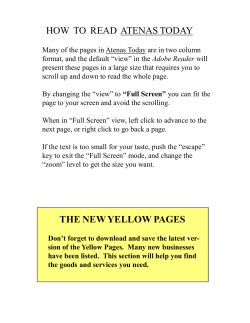
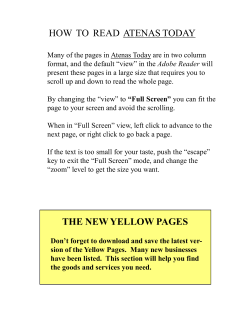
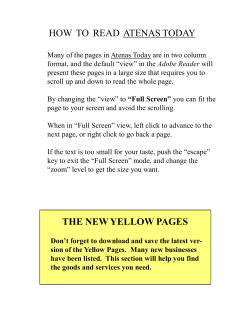
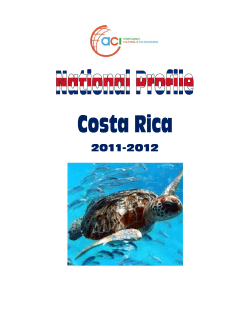
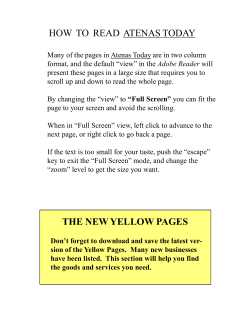

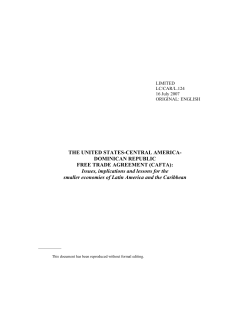
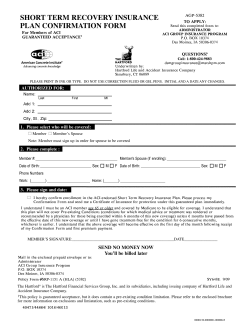
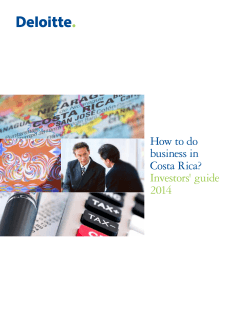
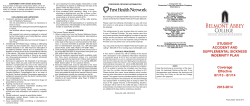
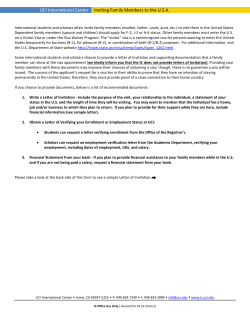
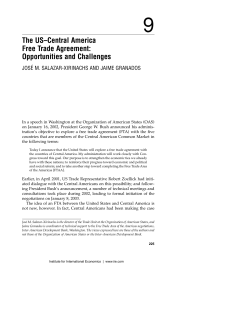
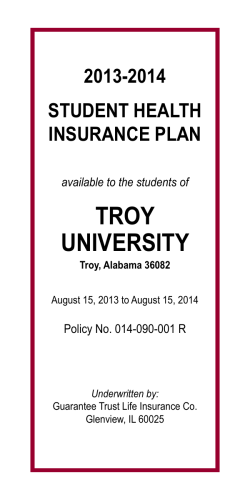
![[NUBAPATA (“I GOT HER IN THE BUSH”)] ( Tape: 22:17-32:26](http://cdn1.abcdocz.com/store/data/000017604_2-27073880fcf6d1689a8931b7b1e28635-250x500.png)
